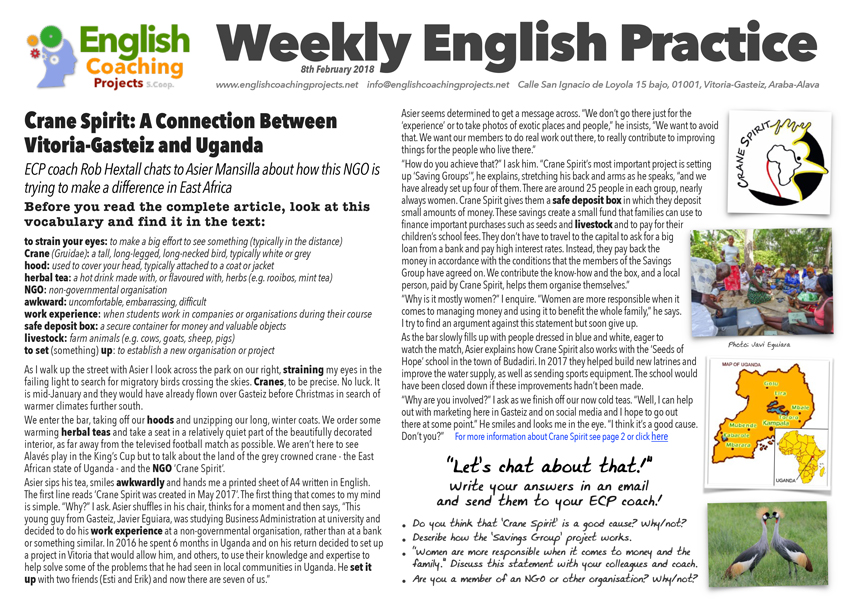Click on the image to download the pdf
ECP coach Rob Hextall chats to Asier Mansilla about how this NGO is trying to make a difference in East Africa
Before you read the complete article, look at this vocabulary and find it in the text:
to strain your eyes: to make a big effort to see something (typically in the distance)
Crane (Gruidae): a tall, long-legged, long-necked bird, typically white or grey
hood: used to cover your head, typically attached to a coat or jacket
herbal tea: a hot drink made with, or flavoured with, herbs (e.g. rooibos, mint tea)
NGO: non-governmental organisation
awkward: uncomfortable, embarrassing, difficult
work experience: when students work in companies or organisations during their course
safe deposit box: a secure container for money and valuable objects
livestock: farm animals (e.g. cows, goats, sheep, pigs)
to set (something) up: to establish a new organisation or project
As I walk up the street with Asier I look across the park on our right, straining my eyes in the failing light to search for migratory birds crossing the skies. Cranes, to be precise. No luck. It is mid-January and they would have already flown over Gasteiz before Christmas in search of warmer climates further south.
We enter the bar, taking off our hoods and unzipping our long, winter coats. We order some warming herbal teas and take a seat in a relatively quiet part of the beautifully decorated interior, as far away from the televised football match as possible. We aren’t here to see Alavés play in the King’s Cup but to talk about the land of the grey crowned crane – the East African state of Uganda – and the NGO ‘Crane Spirit’.
Asier sips his tea, smiles awkwardly and hands me a printed sheet of A4 written in English. The first line reads ‘Crane Spirit was created in May 2017’. The first thing that comes to my mind is simple. “Why?” I ask. Asier shuffles in his chair, thinks for a moment and then says, “This young guy from Gasteiz, Javier Eguiara, was studying Business Administration at university and decided to do his work experience at a non-governmental organisation, rather than at a bank or something similar. In 2016 he spent 6 months in Uganda and on his return decided to set up a project in Vitoria that would allow him, and others, to use their knowledge and expertise to help solve some of the problems that he had seen in local communities in Uganda. He set it up with two friends (Esti and Erik) and now there are seven of us.”
Asier seems determined to get a message across. “We don’t go there just for the ‘experience’ or to take photos of exotic places and people,” he insists, “We want to avoid that. We want our members to do real work out there, to really contribute to improving things for the people who live there.”
“How do you achieve that?” I ask him. “Crane Spirit’s most important project is setting up ‘Saving Groups’”, he explains, stretching his back and arms as he speaks, “and we have already set up four of them. There are around 25 people in each group, nearly always women. Crane Spirit gives them a safe deposit box in which they deposit small amounts of money. These savings create a small fund that families can use to finance important purchases such as seeds and livestock and to pay for their children’s school fees. They don’t have to travel to the capital to ask for a big loan from a bank and pay high interest rates. Instead, they pay back the money in accordance with the conditions that the members of the Savings Group have agreed on. We contribute the know-how and the box, and a local person, paid by Crane Spirit, helps them organise themselves.”
“Why is it mostly women?” I enquire. “Women are more responsible when it comes to managing money and using it to benefit the whole family,” he says. I try to find an argument against this statement but soon give up.
As the bar slowly fills up with people dressed in blue and white, eager to watch the match, Asier explains how Crane Spirit also works with the ‘Seeds of Hope’ school in the town of Budadiri. In 2017 they helped build new latrines and improve the water supply, as well as sending sports equipment. The school would have been closed down if these improvements hadn’t been made.
“Why are you involved?” I ask as we finish off our now cold teas. “Well, I can help out with marketing here in Gasteiz and on social media and I hope to go out there at some point.” He smiles and looks me in the eye. “I think it’s a good cause. Don’t you?”
For more information about Crane Spirit click here
“Let’s chat about that!”
Write your answers in an email and send them to your ECP coach!
- Do you think that ‘Crane Spirit’ is a good cause? Why/not?
- Describe how the ‘Savings Group’ project works.
- “Women are more responsible when it comes to money and the family.” Discuss this statement with your colleagues and coach.
- Are you a member of an NGO or other organisation? Why/not?


